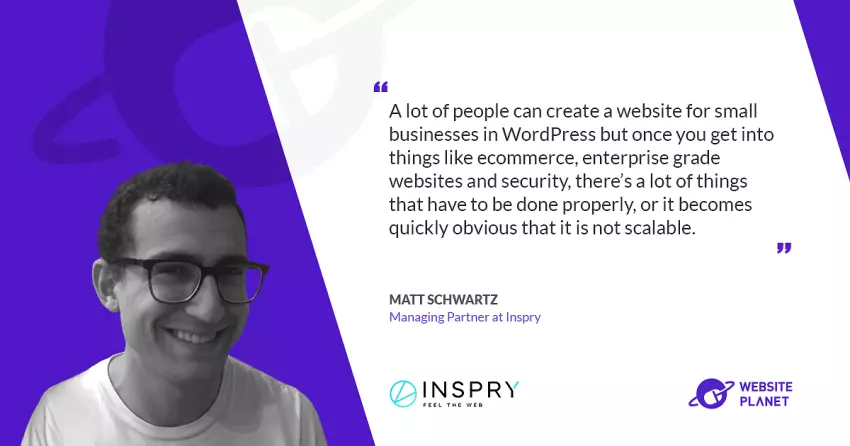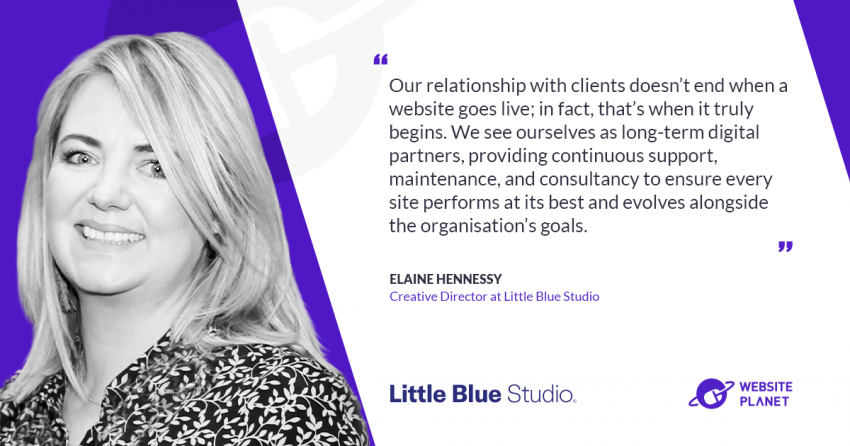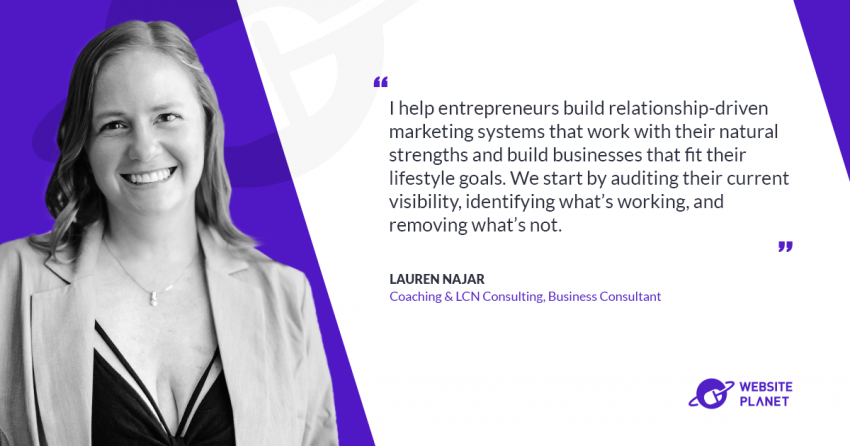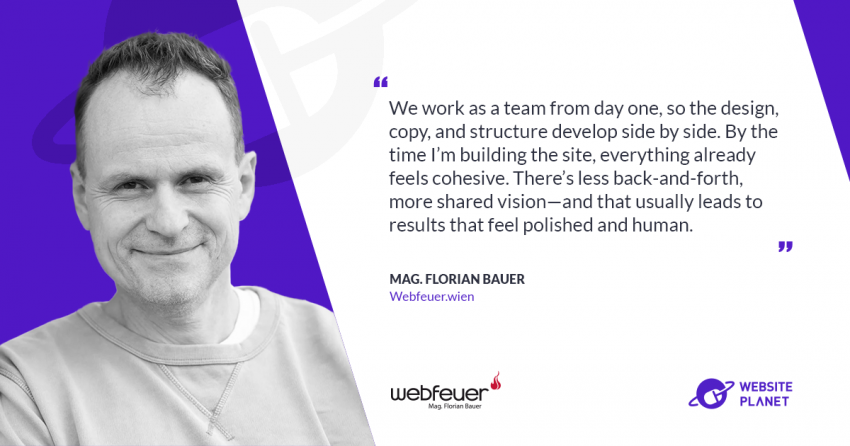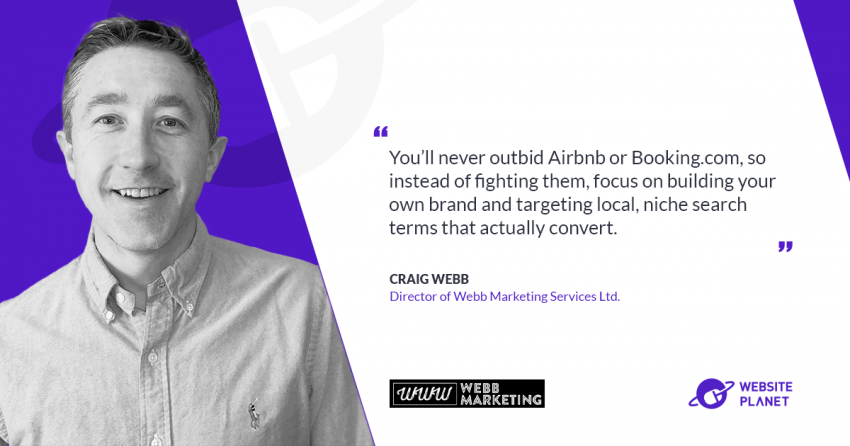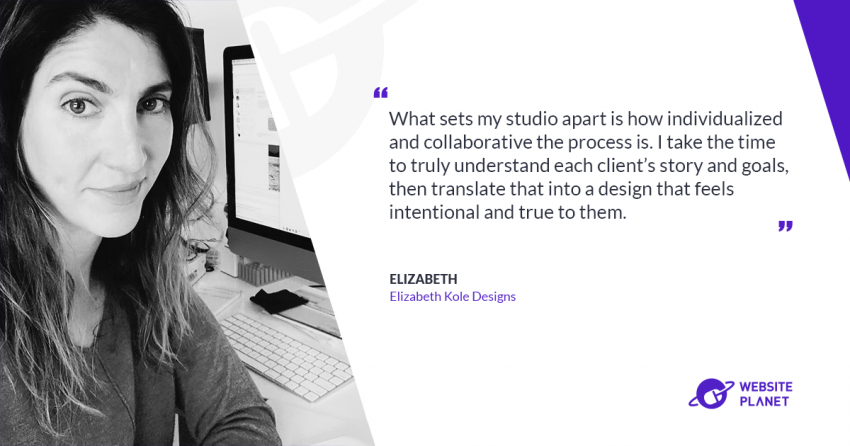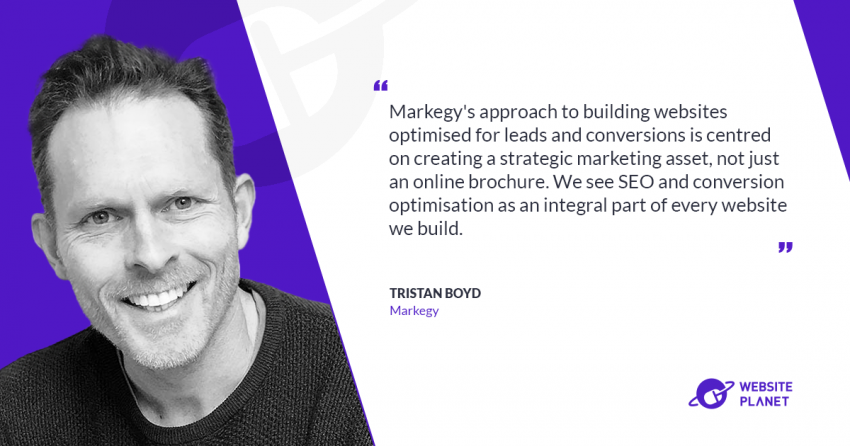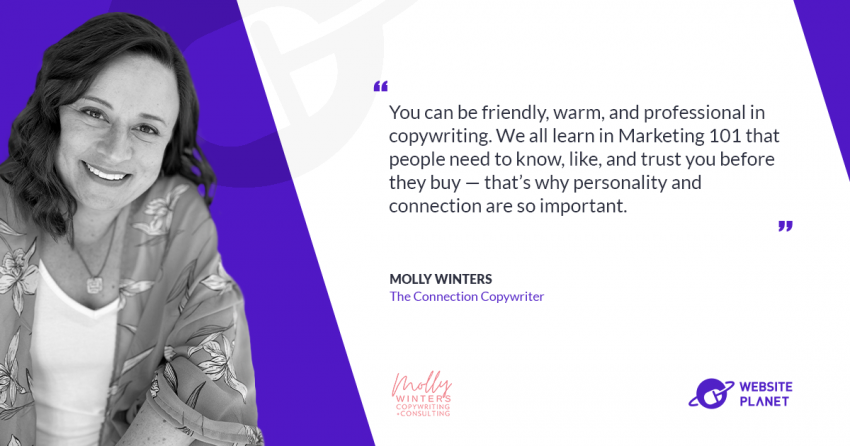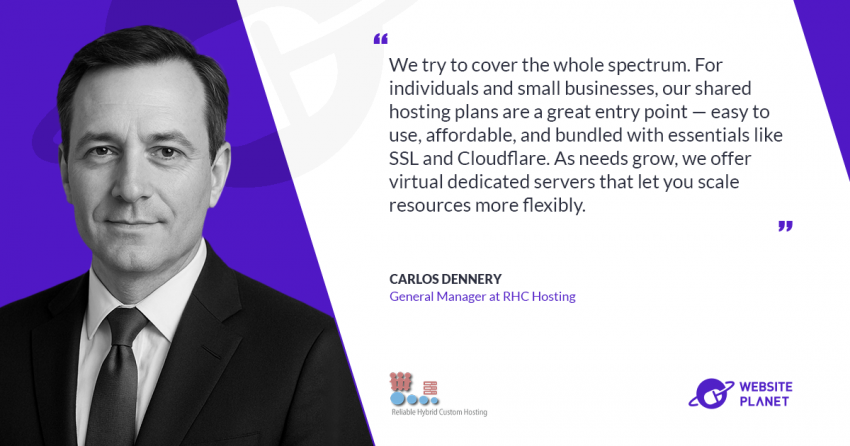If WordPress powers more than one third of the websites on the internet, having a web development agency that is specialized in that CMS makes total sense. This week we talked with Matt Schwartz, Managing Partner at Inspry, to know more about his company, what can Inspry do that other agencies can’t do with the same quality, security issues and also where are we going. Spoiler alert: Progressive Web Apps (PWAs) may be the answer. Check out this special interview for Website Planet below.
Please present Inspry to our audience
I run Inspry, an Atlanta, Georgia-based WordPress web development agency. We’ve been around for a decade, and we try to provide value to clients in the technology consulting side of the web, helping them navigate more complex web terrain.
What that really means is: a lot of times you might have a digital marketing agency, who may be very good in many things or may have an internal creative department, but a lot of times they lack technical knowledge like handling integrations with CRMs or setting up more complex websites with a lot of functionality. That’s where we shine.
Most of our clients are either marketing agencies, internal creative teams, someone at least with a marketing manager to lead strategy, whether it is on the design side, the marketing side or both.
We really try to provide a solution to every client, even if it’s something that we are not performing ourselves. It could be a SaaS product that we recommend because it’ll be a better fit for them in the long run and more cost-effective, thus generating a better ROI than something we may use for custom development. That’s what we try to focus on, always providing a solution.
What can Inspry deliver that other development companies cannot?
We have a couple of points. One is that we have a background in marketing, business, operations. Everyone on our team has worked in that area in some capacity. So, we’ll make sure this is the best fit and push back if we think it’s not going to give you the desired business result – which I think a lot of straight web developing companies don’t necessarily do.
Another point of differentiation within the web development space is that we specialize particularly in WordPress. A lot of companies can do WordPress but that’s 90% of what we do. We do some custom PHP work, but outside of that it’s all WordPress and we have much deeper WordPress knowledge than a typical agency.
A lot of people can create a website for small businesses in WordPress but once you get into things like ecommerce, enterprise grade websites and security, there’s a lot of things that have to be done properly, or it becomes quickly obvious that it is not scalable.
What is your process of communication and settlement with clients?
Typically, we like to start with clients by getting some background of their industry, who their audience is, their pain points, etc. which are things to have at any time when trying to work with a new client and provide a solutions-oriented approach.
Usually, on the first or second call, is where we start to understand what problems they are having and what sort of solution we can provide. Typically, it’s going to be technology or web-driven. We are not one of those agencies that just throws out a lot of cookie cutter proposals. We do a lot of discovery upfront, whether it’s rolling back into the project’s budget later or paid discovery, really to make sure that they are getting what they are looking for out of the solution we come up with.
We are not slapping together a website and calling it a day, which can work with some small businesses but not so much in more complex situations with larger clients. If the client doesn’t have time for the discovery, we’ll do the best we can but typically it will not be a good fit. And that’s ok, we’ll try to refer to them elsewhere.
Besides doing Inspry’s site audit, what can a website owner do to protect their pages?
Some things can be done, but it depends on the platform you are on. I’ll focus here on WordPress but there’s going to be an equivalent in other systems, especially if they are self-hosted and not SaaS products.
For example, having some sort of web application firewall (WAF). As data passes through your server, it’s going to check for signatures, almost like a virus scanner on your computer but with malware and injections. You can have a WAF on your application itself like WordFence for WordPress or at the server level, something like Cloudflare or Sucuri.
It’s one of those things that you definitely want to do, especially if you’re not the best at keeping everything updated in your software.
The second point is: keep your software updated. Changelogs from software should state when they have patched security vulnerabilities with their updates. There are databases you can subscribe to security vulnerabilities and WordPress free databases but, outside of that, sometimes those things just don’t get addressed properly and they get snuck there in the change log, not even get reported, and get patched. And, if you don’t update the software, you’ll be vulnerable without even knowing it.
Keeping your software updated, no matter what your system is, really the #1 thing to do. Another recommendation is limiting login attempts to avoid denial service attacks. Some people only think that they don’t want their sites to be hacked, but a second concern is when your site goes down because of spammers hitting your server.
So, make sure that you limit logins, change any backend logins that you can, so they can’t even find the back in URL; obviously, setting up captchas will help in that process, and running daily malware scanners. Sucuri has a really good product for that, costing around $300 a year per site. They run a daily malware scanner or they’ll even clean up malware and they include a firewall with that.
There are also some companies like WebArc that have free vulnerability reports and scanning as well for WordPress. You have a lot of options out there and a lot of them are free.
Also make sure to use two factor authentication (2FA) and strong password with a password manager such as 1Password.
When you look at it, it’s kind of like a bike lock. It’s not going to stop everybody, but mostly bad scripts that are just scanning the website, looking for out of date software, where they can find the URLs. So, the sites that are vulnerable are at highest risk. Just by doing some of these basic things, you’re going to keep a majority of your risks at bay.
After security, what other tips do you have for website owners regarding strategies to use digital marketing and trends for 2022?
There are many interesting things going on. Progressive web apps are a web development trend that is growing. If you haven’t heard of them, imagine a normal website with app-like functionality. For example, it can pull the geolocation from the customer’s phone, but it can also do things like having an offline mode if the user doesn’t have Internet so they can create an order say in WooCommerce even when offline and once they have Internet again, that order will be submitted automatically by their browser. It feels very fluid, almost like an app. Many times, they are actually faster than native mobile apps.
I expect there’s going to be more movement towards that when people don’t necessarily want to make an app, but they need some app-like functionality. HTML5 and the browser have adopted the ability to do some of these new functionalities. Users are still being educated on how to add PWAs to their home screen, but it is a click of a button once you know it is there and actually faster than installing a native app from the iOS or Android store.
When people are trying to make minimal viable products and they’re not ready to invest, something like $200,000 in a mobile app that’s going to do everything they need. They can start this way, build up their marketing and then build it from there and possibly have both a PWA and native mobile app in the future.
You see big companies like Starbucks with PWA apps. Pinterest’s website is almost identical to their actual app because they’ve added all this functionality that normally would only be in the app.
What do see coming for Inspry in the next 3 to 5 years?
We definitely will stay on the edge from the development side, staying with web trends and continuing to provide those more technical WordPress and web apps solutions that clients are looking for when their digital marketing agency can’t handle it.
The other thing that we’re looking at doing is providing more resources for agencies, like white label work with a lot of agencies on creating custom WordPress plugins. And a couple of software as a service apps that we’re building out on the side, more as a software company, to help WordPress agencies. Hopefully, that will trickle down to the business owners from there and save everyone time and money in the agency space.
